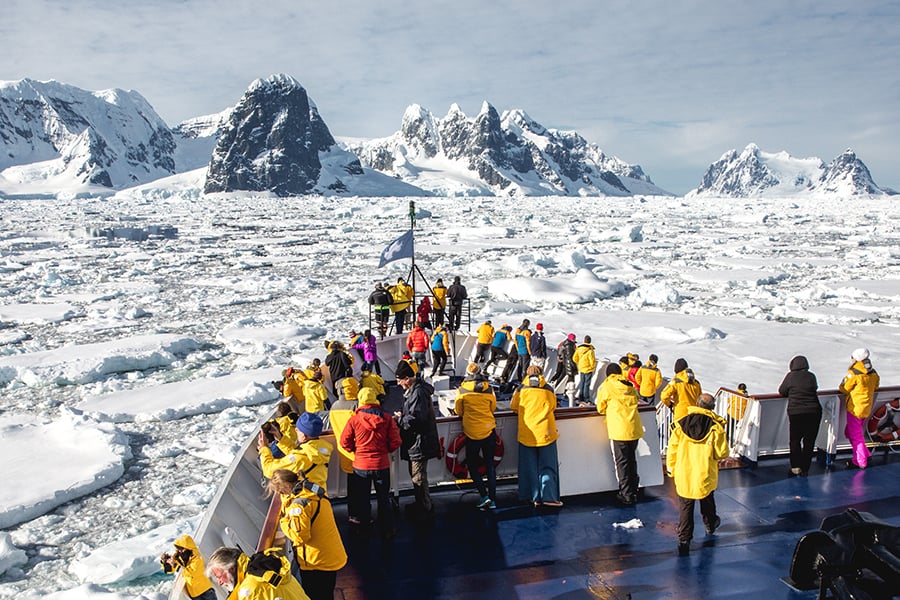Antarctica, a land of pristine wilderness and awe-inspiring landscapes, beckons travelers with its unique beauty and untouched environment. However, due to its remote location and protected status under international treaties, visiting this frozen continent involves some essential legalities. If you’re considering an expedition to the southernmost part of the planet, it’s important to understand the documentation and permissions required. In this article, we’ll explore the key requirements, including passports, visas, permits, and additional considerations for travel to Antarctica, as well as adjacent regions like South Georgia, the South Sandwich Islands, and the Falkland Islands.
Do You Need a Permit to Visit Antarctica?
Travelers who are citizens of countries that are parties to the Antarctic Treaty, which now includes over 50 nations, are required to obtain a permit to visit Antarctica. This requirement was introduced in 1998 with the adoption of the Protocol on Environmental Protection to the Antarctic Treaty, aiming to safeguard the fragile environment of the continent. The good news is that most travelers don’t need to personally handle these permits—tour operators usually take care of this for you. However, if you’re planning an independent trip to Antarctica (which is extremely rare), you’ll need to make sure to obtain the appropriate permits yourself.
Citizens from countries not party to the Antarctic Treaty may technically not need a permit, but there’s a caveat. If you’re traveling with a tour operator based in a Treaty nation (which is highly likely), you’ll need a permit regardless of your nationality. Thankfully, tour companies generally manage all necessary paperwork.
Why Is a Permit Required for Antarctica?
Permits are an essential part of the Antarctic Treaty’s mission to protect the environment of the White Continent. These permissions help regulate and control tourism in this highly sensitive and unique ecosystem. Without them, the impact of human activities could damage this extraordinary and fragile environment.
Restricted or Closed Areas in Antarctica
It’s important to note that permits provided by tour operators do not grant unrestricted access to the entire continent. Travel across Antarctica is highly regulated and restricted, both for the sake of preserving its ecosystems and ensuring visitor safety. Some areas are closed off to protect critical wildlife habitats, such as seabird or seal colonies. While these zones may be accessible to researchers with proper credentials and permits, they are off-limits to tourists.
The Antarctic Treaty has set up specific guidelines for the most visited tourist sites, dictating where and how visitors can explore when they land. Therefore, while your tour operator will handle most of the logistics, it’s vital to respect these restrictions to help maintain Antarctica’s delicate balance.
Do You Need a Passport to Visit Antarctica?
Yes, you will need a valid passport to travel to Antarctica. While no country owns Antarctica, the nations you pass through en route—typically Argentina or Chile—will require a passport. This is a good time to check your passport’s validity and make sure it won’t expire soon.
Keep in mind that there are no foreign embassies or consulates in Antarctica. If you lose your passport during your trip, you’ll need to contact the embassy of the country you’ll be traveling to after your Antarctic adventure for assistance.
Visa Requirements for Antarctica
Do you need a visa to visit Antarctica? No, because no nation claims sovereignty over the continent. However, you may need a visa to enter the country from which you are embarking on your Antarctic journey.
For example, citizens of the United States, the United Kingdom, Australia, and New Zealand do not require a visa to travel from Ushuaia, Argentina, or Punta Arenas, Chile—two of the most common departure points for Antarctic cruises—if their stay is less than 90 days. However, if you plan to extend your trip in South America, such as exploring more of Argentina or Chile, you might need a visa depending on your nationality and the length of your stay.
Health and Travel Insurance
There are no specific vaccination requirements for traveling to Antarctica. That said, you may need to provide proof of vaccinations for the countries you transit through or for certain tour operators. It’s always wise to consult with your healthcare provider about recommended vaccinations for your travel route and destinations before and after your Antarctic journey.
In light of the COVID-19 pandemic, you will also need to comply with the specific requirements of the countries you’ll be traveling through and the tour company you’re booking with. This could include proof of vaccination, negative test results, or quarantine protocols.
Travel insurance is also mandatory for Antarctic voyages, and it’s a good idea to invest in comprehensive coverage. This is especially important as it helps cover unexpected events like medical evacuations, which can be extraordinarily expensive in such a remote location.
Visa and Permit Requirements for South Georgia, South Sandwich Islands, and the Falkland Islands
For those embarking on longer cruises, it’s common to visit other Southern Ocean destinations, such as the Falkland Islands, South Georgia, and the South Sandwich Islands. It’s essential to understand the entry requirements for these territories if your itinerary includes them.
Falkland Islands (Islas Malvinas)
If you’re visiting the Falkland Islands, you’ll need a passport. Citizens of the United States, United Kingdom, Canada, Australia, Japan, and EU countries do not require a visa for a short visit to the Falklands, nor do travelers of any nationality arriving via cruise ship. Visitors to the Falkland Islands should also have a return ticket, pre-arranged accommodation, and sufficient funds for the duration of their stay. For extended stays, different visa regulations apply.
South Georgia and the South Sandwich Islands
As for South Georgia and the South Sandwich Islands, which are often included on Antarctic cruise itineraries, a visa is not required. However, as with the Falklands, it’s essential to have a valid passport.
Drone and Photography Permits in Antarctica
Given the emphasis on permits for traveling to Antarctica, many visitors also ask about the rules for photography and the use of drones. The use of drones or Unmanned Aerial Vehicles (UAVs) has surged in popularity, particularly among photographers and videographers. However, the International Association of Antarctic Tour Operators (IAATO) currently prohibits the recreational use of drones in Antarctica due to concerns over wildlife disturbance and environmental contamination.
Flying drones in such extreme conditions poses significant risks. Not only do the cold and winds affect their performance, but there’s also a risk of crashes, which could leave behind foreign debris in Antarctica’s pristine environment. Despite these challenges, those wishing to use drones for research, filming, or other specialized purposes can apply for specific permits.
On the other hand, recreational photography is permitted, and many travelers bring their cameras to capture the stunning scenery and wildlife. Professional photographers or filmmakers may require additional permits, particularly if they are documenting in sensitive areas or working on commercial projects.
The Antarctic World Passport
When discussing passports for Antarctica, it’s important to mention an intriguing and symbolic document: the Antarctic World Passport. Although not a legal travel document, this non-official digital passport was created by artists Lucy and Jorge Orta as a way to celebrate the unique status of Antarctica as a land without borders. It’s designed to raise awareness of global environmental issues, particularly climate change.
While you won’t need this passport to enter Antarctica, you can join nearly 43,000 others who have signed up for the Antarctic World Passport as a symbolic gesture. Some Antarctic research stations even offer unofficial passport stamps as souvenirs, though it’s a good idea to have these stamps placed on a piece of memorabilia rather than your official passport.
What’s Required for Travel to Antarctica?
Compared to other travel destinations, the documentation required for an Antarctic journey is relatively minimal. What’s most important is your sense of adventure, your respect for the pristine and delicate environment of the continent, and the logistical arrangements made by your tour operator. The Antarctic Treaty and IAATO guidelines ensure that tourism here is conducted responsibly and sustainably, minimizing human impact on one of the last truly wild places on Earth.
In conclusion, whether you’re captivated by the icy beauty of the Antarctic Peninsula, curious about the unique wildlife, or simply eager for a once-in-a-lifetime adventure, the legalities of visiting the White Continent are straightforward. You’ll need a passport, and possibly a visa depending on your route, but the key permissions will generally be handled by your tour operator. Just remember to pack your adventurous spirit and prepare to witness Earth’s final frontier.



